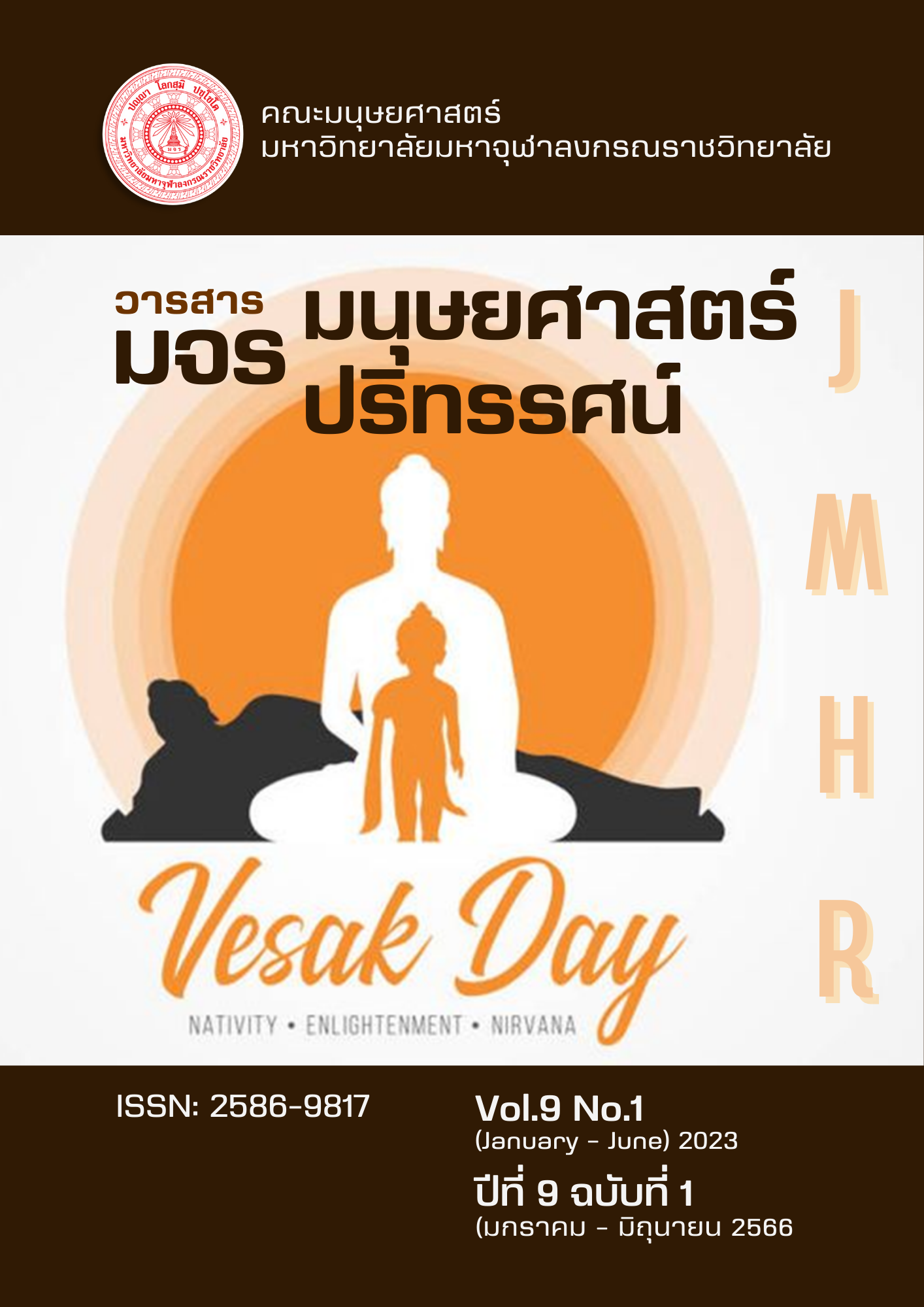รูปแบบพุทธจิตวิทยาในการส่งเสริมสุขภาวะองค์รวมสำหรับผู้สูงวัยที่ได้รับผลกระทบจากสุขภาพกาย
คำสำคัญ:
ผู้สูงวัย, สุขภาวะองค์รวม, บูรณาการ, พุทธจิตวิทยาบทคัดย่อ
การวิจัยนี้มีวัตถุประสงค์ 1. เพื่อวิเคราะห์ปัญหาสุขภาวะองค์รวมของผู้สูงวัยที่ได้รับผลกระทบจากสุขภาพกาย 2. เพื่อสังเคราะห์หลักพุทธธรรมและหลักจิตวิทยา ในการส่งเสริมสุขภาวะองค์รวมสำหรับผู้สูงวัยที่มีผลกระทบจากสุขภาพกาย 3. เพื่อนำเสนอรูปแบบของพุทธจิตวิทยาในการส่งเสริมสุขภาวะองค์รวม สำหรับผู้สูงวัยที่มีผลกระทบจากสุขภาพกาย เป็นการวิจัยเชิงคุณภาพ (Qualitative Research) เครื่องมือที่ใช้ในการวิจัย ได้แก่ การทบทวนวรรณกรรม (Literature Review) การสัมภาษณ์เชิงลึก (In Depth Interview) การสนทนากลุ่ม(Focus Group Discussion) และการประชุมผู้เชี่ยวชาญพิเศษ (Connoisseurship) เทคนิควิธีการวิเคราะห์ข้อมูลขั้นสูง ได้แก่ การวิเคราะห์ 6’C การยืนยันเทคนิค 3 เส้า (Triangulation Technic) และหลักโยนิโสมนสิการ
ผลการวิจัยพบว่า
- ผู้สูงวัยมีความเสื่อมทางกาย 2 ประเภท คือ 1) ความเสื่อมที่หลีกเลี่ยงไม่ได้ และ 2) ความเสื่อมที่หลีกเลี่ยงได้ ความเสื่อมทางกายจะส่งผลกระทบต่อความสุของค์รวมทั้ง 5 ด้าน ได้แก่ 1) ทางกาย 2) ทางใจ 3) ทางอารมณ์ 4) ทางสังคม และ 5) ทางปัญญา
- หลักพุทธธรรมที่ส่งเสริมให้เกิดความสุของค์รวมมีดังนี้ 1) มีสติตั้งมั่นในภาวนา 4 คือการครองกาย ครองศีล ครองใจและครองปัญญา 2) เข้าถึงอริยสัจจ์ 4 คือ การเข้าใจในทุกข์และสามารถแก้ไขให้ล่วงจากทุกข์ไปได้ 3) เข้าใจในหลักไตรลักษณ์ว่า ทุกสิ่งไม่เที่ยงแท้แน่นอนเป็นธรรมดา และ 4) มีคุณสมบัติพร้อมไปด้วยพรหมวิหาร 4 คือ เมตตา กรุณา มุทิตาและอุเบกขา นำมาบูรณาการร่วมกับทฤษฎีจิตวิทยา ได้แก่ การคิดบวกและการรับรู้ความสามารถของตนเอง ส่งเสริมให้ผู้สูงวัยเกิดการเตรียมพร้อม ด้วยหลัก 4 ต สำหรับ ฒ ผู้เฒ่า ได้แก่ เตรียมตัว เตรียมตังค์ เตรียมสติและเตรียมตาย ผู้สูงวัยจะเกิดมีความสุของค์รวมได้อย่างยั่งยืน
- รูปแบบของพุทธจิตวิทยาในการส่งเสริมสุขภาวะองค์รวมสำหรับผู้สูงวัยที่มีผลกระทบจากสุขภาพกาย เกิดจากการบูรณาการ 4 หลักพุทธธรรมกับ 2 ทฤษฎีทางจิตวิทยา ดังที่กล่าวมานั้น ได้รับการยืนยันจากผู้ทรงคุณวุฒิว่ามีความถูกต้อง เหมาะสม เป็นไปได้และความมีประโยชน์ ในรูปแบบองค์ความรู้ใหม่
เอกสารอ้างอิง
กรมการปกครอง กระทรวงมหาดไทย. (2565). สถิติผู้สูงอายุไทย. สืบค้น 31 ธันวาคม 2565, จาก https://stat.bora.dora.go.th/newstat/webPage/StatByAgeMonth.php
กรมสุขภาพจิต กระทรวงสาธารณสุข. (2565). หัวใจ 4 ห้องแห่งความสุข. สืบค้น 30 ธันวาคม 2565, จาก http://www.prdmh.com/component/content/article/105
ทัศมาวดี ฉากภาพ และ กรกต ชาบัณฑิต. (2564). หลักพุทธธรรมสำหรับการพัฒนาสุขภาวะของผู้สูงอายุ. วารสารวิทยาลัยสงฆ์นครลำปาง, 10(1), 177-186.
พระพรหมคุณาภรณ์ (ป.อ.ปยุตโต). (2557). พจนานุกรมพุทธศาสตร์ ฉบับประมวลธรรม (พิมพ์ครั้งที่ 27). กรุงเทพฯ : มหาจุฬาลงกรณราชวิทยาลัย.
พระครูพิสณฑ์สิทธิการ (อรุณ ธมฺมวโร). (2561). กระบวนการเสริมสร้างสุขภาวะพลังบวกของผู้สูงอายุตามแนวพุทธจิตวิทยา (ดุษฎีนิพนธ์พุทธศาสตรดาฎีบัณฑิต). มหาวิทยาลัยมหาจุฬาลงกรณราชวิทยาลัย. พระนครศรีอยุธยา.
พระธรรมปิฎกก (ป. อ. ปยุตฺโต). (2558). สุขภาวะองค์รวมแนวพุทธ (พิมพ์ครั้งที่ 35). กรุงเทพฯ : มูลนิธิพุทธรรม.
สุวรรณี ไวท์, สิริวัฒน์ ศรีเครือดง และ สุวัฒสัน รักขันโท. (2564). พุทธจิตวิทยากับการพัฒนาตนให้มีความสุข. วารสาร มจร มนุษยศาสตร์ปริทรรศน์, 7(1), 425-466.
อัจฉรา วิเศษวร และ พุทธชาติ แผนสมบุญ. (2565). สุขภาวะองค์รวม: ผู้สูงวัยป่วยกายไม่ป่วยใจตามแนวพุทธจิตวิทยา. วารสาร มจร มนุษยศาสตร์ปริทรรศน์, 8(1), 435.
อัจฉรา วิเศษวร และ สุวัฒสัน รักขันโท. (2564). หลักคำสอนทางพระพุทธศาสนาเพื่อความมั่นคงทางเศรษฐกิจของชีวิต. วารสาร มจร มนุษยศาสตร์ปริทรรศน์, 7(2), 387-398.
อำไพ ลีละรัตนวงศ์ และ สุวัฒสัน รักขันโท. (2564). สุขเกษียณด้วยหลักธรรมตามแนวพุทธจิตวิทยา. วารสาร มจร มนุษยศาสตร์ปริทรรศน์, 7(1), 455-440.
ดาวน์โหลด
เผยแพร่แล้ว
รูปแบบการอ้างอิง
ฉบับ
ประเภทบทความ
หมวดหมู่
สัญญาอนุญาต
ลิขสิทธิ์ (c) 2023 วารสาร มจร มนุษยศาสตร์ปริทรรศน์

อนุญาตภายใต้เงื่อนไข Creative Commons Attribution-NonCommercial-NoDerivatives 4.0 International License.






